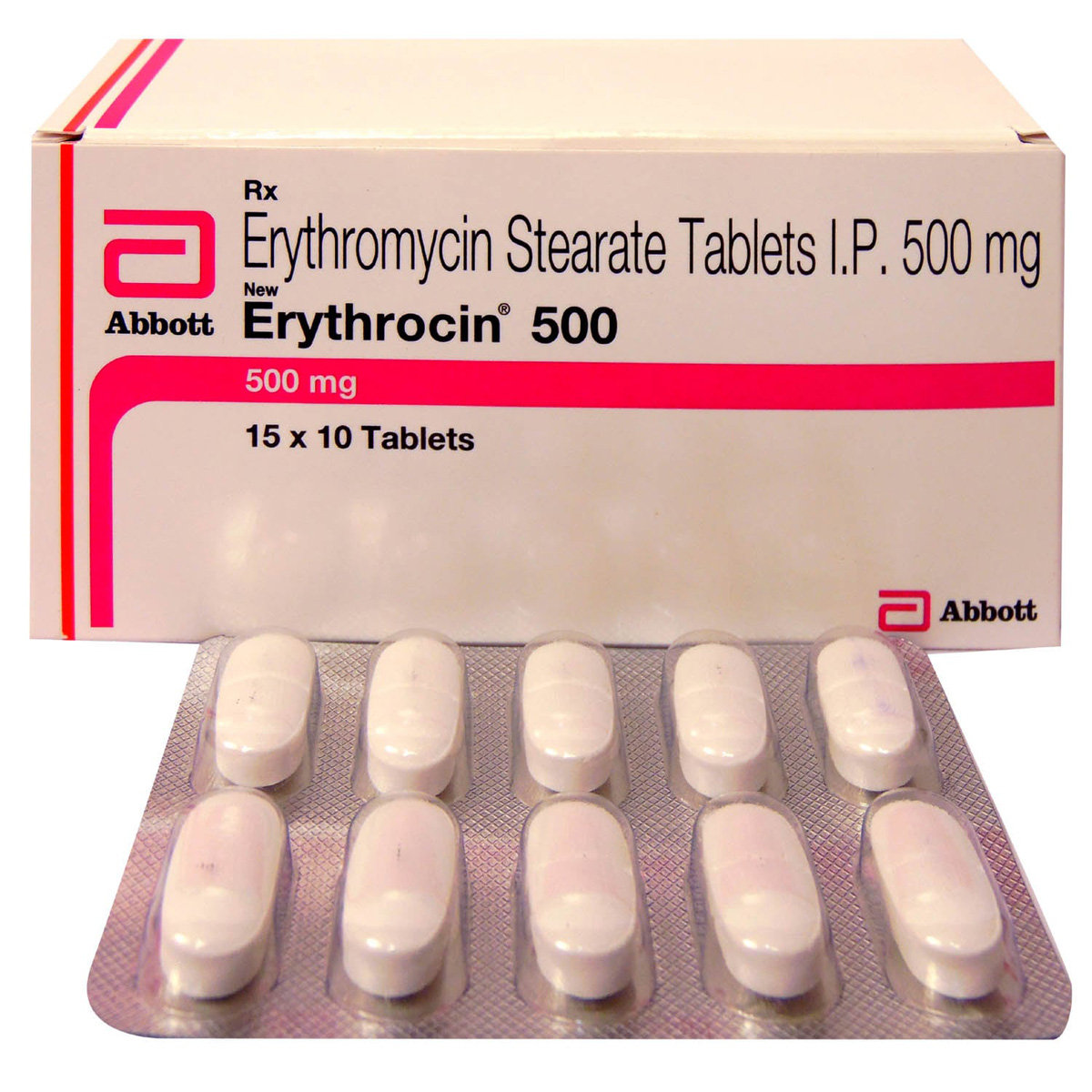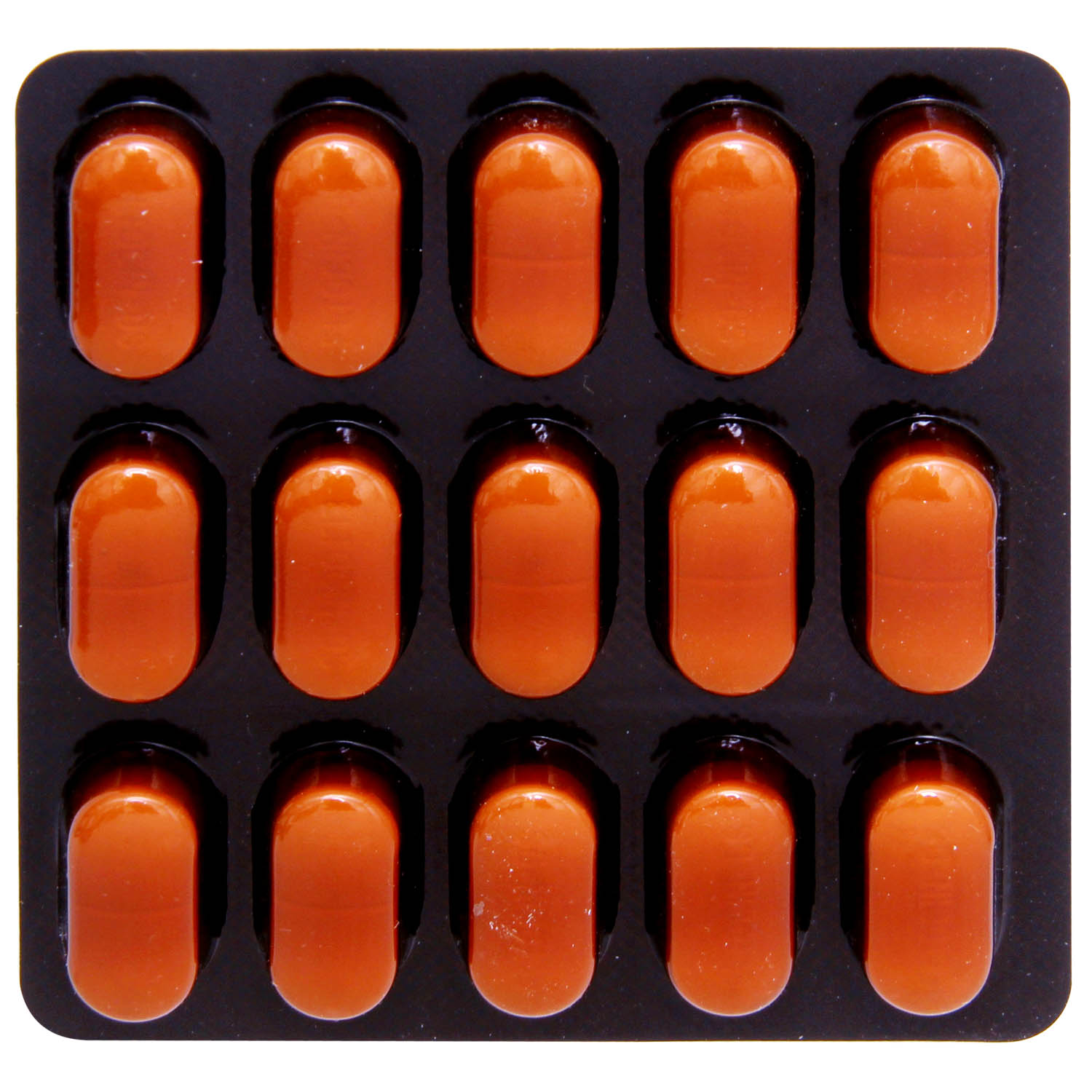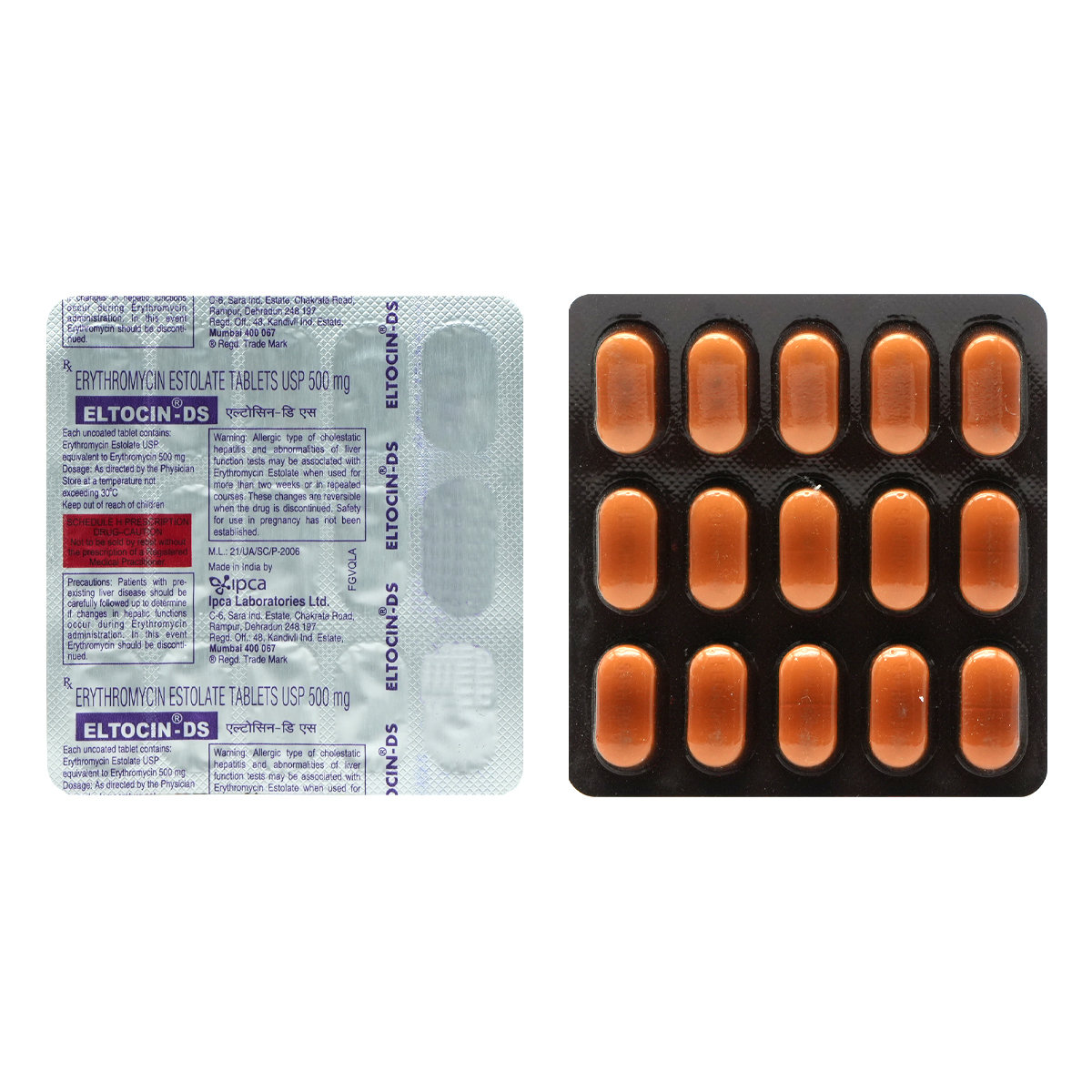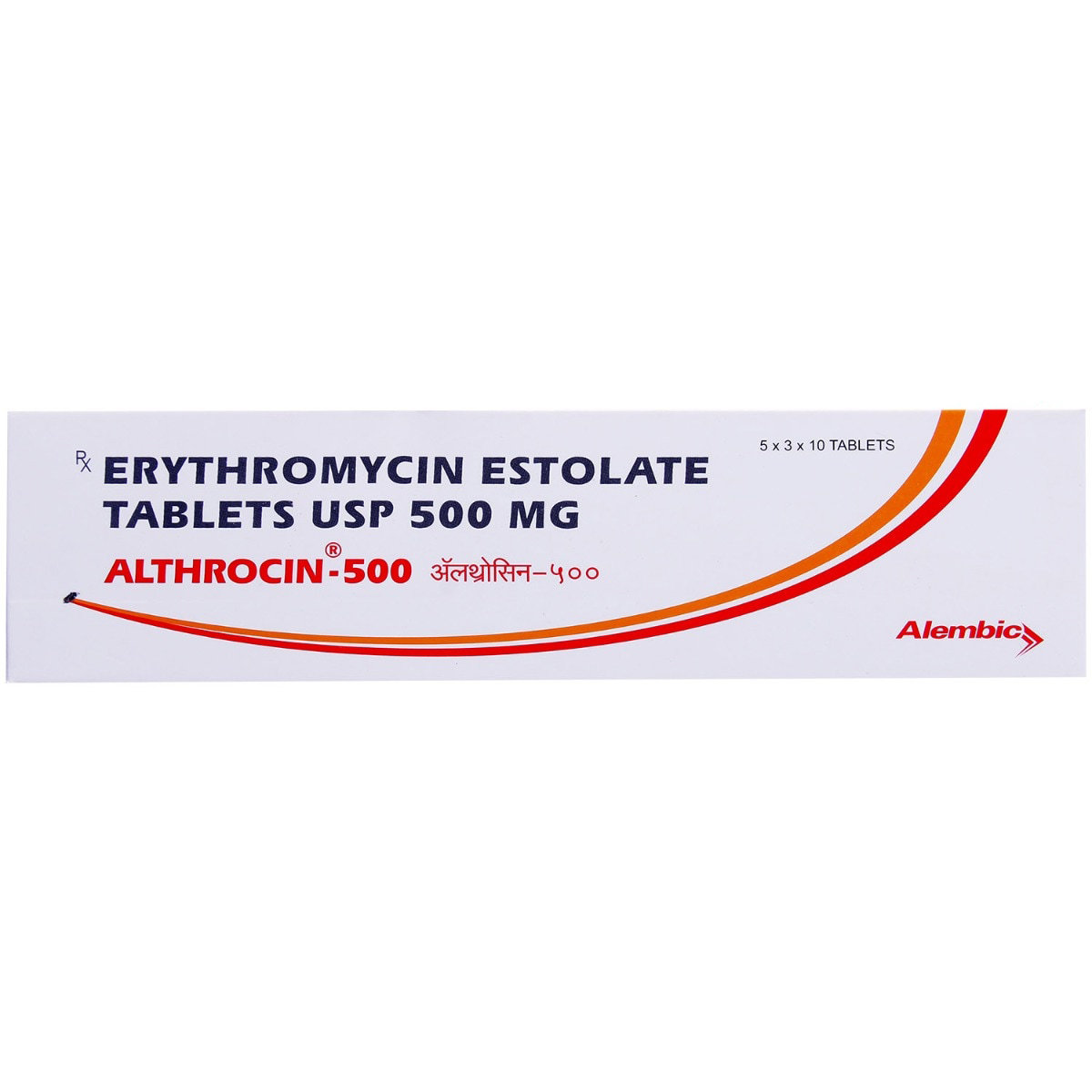Aritomycin 500mg Tablet
MRP ₹51.75
(Inclusive of all Taxes)
₹7.8 Cashback (15%)
Provide Delivery Location
Online payment accepted
 Prescription drug
Prescription drugWhats That
Composition :
Manufacturer/Marketer :
Consume Type :
Return Policy :
About Aritomycin 500mg Tablet
Aritomycin 500mg Tablet belongs to a group of medicines known as macrolide antibiotics. It's widely used to treat chest infections (pneumonia), skin conditions (acne and rosacea), dental abscesses (A pocket of pus in a tooth caused by an infection), and sexually transmitted infections. On the other hand, in children, Aritomycin 500mg Tablet is generally used to treat ear or chest infections. Bacterial infection is a condition in which bacteria grow in the body and cause infection. It can target any body part and multiple very quickly.
Aritomycin 500mg Tablet comprises Erythromycin, which works by slowing the growth or killing the harmful bacteria by preventing the production of proteins required by the bacteria for its survival. As a result, it effectively treats various bacterial infections.
Aritomycin 500mg Tablet should only be taken if advised by your doctor. It can be taken with or without food but should be consumed at a fixed time for the best results. Aritomycin 500mg Tablet should not be consumed more than the recommended dose to avoid unpleasant side effects. And also, the course should be completed even if you feel better as it is an antibiotic. Some common side effects of Aritomycin 500mg Tablet are diarrhoea, nausea, vomiting, and indigestion. Allergic reactions such as rashes, itching, swelling, and shortness of breath can occur in rare cases. Please consult your doctor if an allergic reaction becomes severe.
Do not take Aritomycin 500mg Tablet if you are allergic to Erythromycin or other macrolide antibiotics such as clarithromycin, azithromycin, or any of the other ingredients of this medicine. Tell your doctor if you have liver problems, muscle problems (myasthenia gravis), heart rhythm disorder (arrhythmia), porphyria (rare genetic blood disorder), and electrolyte imbalance (low potassium or magnesium level). In rare cases, the use of Aritomycin 500mg Tablet can cause diarrhoea, so if you have watery or bloody diarrhoea, stop taking Aritomycin 500mg Tablet and call your d ctor. However, do not take any anti-diarrheal medicine until your doctor tells you. If you are pregnant or breastfeeding, suspect you may be pregnant or plan to have a baby, consult your doctor before taking this medica ion. Women should onlyErythromycinmycin during pregnancy and lactation if absolutely necessary.
Uses of Aritomycin 500mg Tablet
Directions for Use
Key Benefits
Aritomycin 500mg Tablet comprises Erythromycin, is a macrolide antibiotic. Aritomycin 500mg Tablet kills the harmful bacteria by preventing the protein production required for bacteria to survive. Thereby it prevents and treats bacterial infections like throat and sinus infections, chest infections (like bronchitis and pneumonia), ear infections, mouth and dental infections, eye infections, skin and tissue infections (like acne), and stomach and intestinal infections. Besides this, it also helps prevent infection following burns, surgery or dental procedure, sexually transmitted infections, bone infections or scarlet fever (bacterial illness with strep throat).
Storage
- Inform your doctor about dizziness symptoms. They may adjust your medication regimen or prescribe additional medications to manage symptoms.
- Follow your doctor's instructions for taking medication, and take it at the same time every day to minimize dizziness.
- When standing up, do so slowly and carefully to avoid sudden dizziness.
- Avoid making sudden movements, such as turning or bending quickly, which can exacerbate dizziness.
- Drink plenty of water throughout the day to stay hydrated and help alleviate dizziness symptoms.
- If you're feeling dizzy, sit or lie down and rest until the dizziness passes.
- Track when dizziness occurs and any factors that may trigger it, and share this information with your doctor to help manage symptoms.
- Inform your doctor about the nausea and discuss possible alternatives to the medication or adjustments to the dosage.
- Divide your daily food intake into smaller, more frequent meals to reduce nausea.
- Opt for bland, easily digestible foods like crackers, toast, plain rice, bananas, and applesauce.
- Avoid certain foods that can trigger nausea, such as fatty, greasy, spicy, and smelly foods.
- Drink plenty of fluids, such as water, clear broth, or electrolyte-rich beverages like coconut water or sports drinks.
- Use ginger (tea, ale, or candies) to help relieve nausea.
- Get adequate rest and also avoid strenuous activities that can worsen nausea.
- Talk to your doctor about taking anti-nausea medication if your nausea is severe.
- Record when your nausea occurs, what triggers it, and what provides relief to help you identify patterns and manage your symptoms more effectively.
- Inform Your Doctor: Notify your doctor immediately about your diarrhoea symptoms. This allows them to adjust your medication or provide guidance on managing side effects.
- Stay Hydrated: Drink plenty of fluids to replace lost water and electrolytes. Choose water, clear broth, and electrolyte-rich drinks. Avoid carbonated or caffeinated beverages to effectively rehydrate your body.
- Follow a Bland Diet: Eat easy-to-digest foods to help firm up your stool and settle your stomach. Try incorporating bananas, rice, applesauce, toast, plain crackers, and boiled vegetables into your diet.
- Avoid Trigger Foods: Steer clear of foods that can worsen diarrhoea, such as spicy, fatty, or greasy foods, high-fibre foods, and dairy products (especially if you're lactose intolerant).
- Practice Good Hygiene: Maintain good hygiene to prevent the spread of infection. To stay healthy, wash your hands frequently, clean and disinfect surfaces regularly, and avoid exchanging personal belongings with others.
- Take Anti-Diarrheal Medications: If your doctor advises, anti-diarrheal medications such as loperamide might help manage diarrhoea symptoms. Always follow your doctor's directions.
- Keep track of your diarrhoea symptoms. If they don't get better or worse or are accompanied by severe stomach pain, blood, or dehydration signs (like extreme thirst or dark urine), seek medical help.
- Preventing Vomiting (Before it Happens)
- Take medication exactly as prescribed by your doctor. This can help minimize side effects, including vomiting.
- Having a small meal before taking your medication can help reduce nausea and vomiting.
- Talk to your doctor about taking anti-nausea medication along with your prescribed medication.
- Managing Vomiting (If it Happens)
- Try taking ginger in the form of tea, ale, or candy to help alleviate nausea and vomiting.
- What to Do if Vomiting Persists
- Consult your doctor if vomiting continues or worsens, consult the doctor for guidance on adjusting your medication or additional treatment.
Drug Warnings
Do not take it if you are allergic to Aritomycin 500mg Tablet or other macrolide antibiotics. Even if you feel better, do not stop taking your medication. If you discontinue treatment too soon, your condition may reoccur. Inform your doctor if you have liver problems, myasthenia gravis (muscle weakness), a heart rhythm disorder (arrhythmia), or an electrolyte imbalance (low potassium or magnesium level). In rare situations, using Aritomycin 500mg Tablet might induce diarrhoea; thus, if you have watery or bloody diarrhoea, stop taking Aritomycin 500mg Tablet and consult your doctor. However, do not take anti-diarrheal medication until your doctor tells you to. Before using Aritomycin 500mg Tablet, consult your doctor if you are pregnant, planning to become pregnant, or breastfeeding. It is advisable to avoid alcohol to prevent the chance of adverse effects such as dizziness. Before taking the Aritomycin 500mg Tablet, inform your doctor about your medical history and other medications you are now taking to rule out any potential adverse effects or interactions.
Drug-Drug Interactions
Drug-Drug Interactions
Login/Sign Up
Coadministration of Aritomycin 500mg Tablet and simvastatin can increase the blood levels and effects of simvastatin. This can increase the risk of side effects such as liver damage and rhabdomyolysis( involves the breakdown of skeletal muscle tissue).
How to manage the interaction:
Taking Aritomycin 500mg Tablet and Simvastatin together is not recommended as it can lead to an interaction, but it can be taken if advised by your doctor. However, if you experience any symptoms like muscle pain or weakness, dark-colored urine, joint pain, itching, fatigue, or yellowing of the skin or eyes, contact your doctor immediately. Do not discontinue any medications without consulting your doctor.
When Lomitapide is taken with Aritomycin 500mg Tablet, the amount of Lomitapide in the blood can go up.
How to manage the interaction:
Taking Aritomycin 500mg Tablet with Lomitapide is not recommended, please consult your doctor before taking it. It can be taken if your doctor prescribes it. Do not stop taking any medication without consulting your doctor.
Taking Aritomycin 500mg Tablet with Ziprasidone can increase the risk of irregular heart rhythm.
How to manage the interaction:
Taking Aritomycin 500mg Tablet with Ziprasidone is not recommended, but it can be taken together if prescribed by a doctor. However, consult your doctor if you experience sudden dizziness, lightheadedness, fainting, shortness of breath. Do not discontinue any medications without consulting a doctor.
When Dihydroergotamine is taken with Aritomycin 500mg Tablet, the amount of Dihydroergotamine in the blood can go up.
How to manage the interaction:
There may be a possibility of interaction between Aritomycin 500mg Tablet and Dihydroergotamine, but it can be taken if prescribed by a doctor. Do not stop using any medications without talking to your doctor.
Combining Aritomycin 500mg Tablet with Thioridazine can increase the risk of irregular heart rhythms.
How to manage the interaction:
Taking Aritomycin 500mg Tablet with Thioridazine together results in an interaction, but it can be taken if your doctor has advised it. If you have any of these symptoms - an irregular heart rhythm, diarrhea, vomiting, sudden dizziness, trouble breathing - contact your doctor right away. Do not stop using any medications without talking to your doctor.
Taking Fluconazole with Aritomycin 500mg Tablet can increase the risk of heart rhythm problems.
How to manage the interaction:
Taking Fluconazole with Aritomycin 500mg Tablet together can possibly result in an interaction, but it can be taken if a doctor has advised it. However, consult a doctor immediately if you experience dizziness, lightheadedness, fainting, shortness of breath, or heart palpitations. Do not discontinue any medications without consulting a doctor.
When alfuzosin is taken with Aritomycin 500mg Tablet, this can cause your blood pressure to fall excessively and your heart rate to increase, especially when you rise from a sitting or lying position.
How to manage the interaction:
Taking Aritomycin 500mg Tablet with alfuzosin is not recommended as it can result in an interaction, but it should be taken if your doctor has advised it. However, if you experience dizziness, headache, or shortness of breath, contact your doctor immediately. Do not discontinue any medications without consulting a doctor.
Taking Aritomycin 500mg Tablet and Sotalol can increase the risk or severity of irregular heart rhythm.
How to manage the interaction:
Although taking Aritomycin 500mg Tablet and Sotalol together can result in an interaction, they can be taken together if prescribed by a doctor. However, if you experience sudden dizziness, lightheadedness, seizures, shortness of breath, or heart palpitations, consult a doctor immediately. Do not discontinue using any medications without consulting a doctor.
Coadministration of morphine with Aritomycin 500mg Tablet may increase the blood levels and side effects of morphine including difficulty breathing, and extreme sleepiness.
How to manage the interaction:
Co-administration of morphine with Aritomycin 500mg Tablet can result in an interaction, but it can be taken if a doctor has advised it. However, if you experience dizziness, sleepiness, difficulties concentrating, or impairment in judgement, contact a doctor right away. Do not stop using any medications without consulting a doctor.
Aritomycin 500mg Tablet can considerably increase blood levels of bosutinib. This can increase side effects such as nausea, vomiting, abdominal pain, diarrhea and liver problems
How to manage the interaction:
Taking Bosutinib with Aritomycin 500mg Tablet together can result in an interaction, but it can be taken if your doctor has advised it. If you experience symptoms like tiredness, dizziness, fever, sore throat, unexplained weight loss, nausea, vomiting, stomach pain, or diarrhea, contact your doctor right away. Do not discontinue any medications without consulting a doctor.
Drug-Food Interactions
Drug-Food Interactions
Login/Sign Up
Grapefruit Juice, Grapefruit
How to manage the interaction:
Grapefruit and grapefruit juice can increase the blood levels and effects of Aritomycin 500mg Tablet. Avoid or limit the consumption of grapefruit.
Diet & Lifestyle Advise
- You should take probiotics after taking the full course of Aritomycin 500mg Tablet to restore some healthy bacteria in the intestines that may have been killed. Taking probiotics after antibiotic treatment can reduce the risk of antibiotic-associated diarrhoea. Certain fermented foods like yoghurt, cheese, sauerkraut, kombucha and kimchi can help restore the intestine's good bacteria.
- Include more fibre-enriched food in your diet, as it can be easily digested by your gut bacteria, which helps stimulate their growth. Thus, fibre foods may help restore healthy gut bacteria after a course of antibiotics. Whole grains like whole-grain bread and brown rice should be included in your diet.
- Avoid taking too much calcium, iron-enriched foods and drinks as it might affect the working of Aritomycin 500mg Tablet.
- Avoid intake of alcoholic beverages with Aritomycin 500mg Tablet as it can make you dehydrated and affect your sleep. This can make it harder for your body to aid the Aritomycin 500mg Tablet in fighting off infections.
Side Effects of Aritomycin 500mg Tablet
- Diarrhoea
- Feeling sick or nausea
- Being sick or vomiting
- Stomach cramps
- Loss of appetite
- Bloating
- Indigestion
Habit Forming
Therapeutic Class
All Substitutes & Brand Comparisons
RX
Out of StockAlthraled 500mg Tablet
Universal Micro Sciences
₹44.7
(₹4.02 per unit)
13% CHEAPERRX
Out of StockGlomycin 500mg Tablet
₹52
(₹4.68 per unit)
RX
Out of StockE Mycin 500mg Tablet
Themis Medicare Ltd
₹59.11
(₹5.32 per unit)
14% COSTLIER
Drug-Diseases Interactions
Drug-Diseases Interactions
Login/Sign Up
FAQs
Drug-Drug Interactions Checker List
- ASTEMIZOLE
- TERFENADINE
- MIZOLASTINE
- DOMPERIDONE
- PIMOZIDE
- AMISULPRIDE
- ERGOTAMINE
- DIHYDROERGOTAMINE
- SIMVASTATIN
- TOLTERODINE
- COLCHICINE
Disease/Condition Glossary
A bacterial infection is a condition in which harmful bacteria enter, multiply, and infect our body. It can target any body part and multiple very quickly. When you get infected with bacteria, you can experience generalized symptoms like fevers, chills, and fatigue. Bacteria are of various forms comprising commonly spherical, rod, and spiral-shaped. Bacterial infections vary from minor illnesses like sore throat and ear infections to severe brain infections like meningitis and encephalitis. Few harmful bacteria that cause infections include Streptococcus, Staphylococcus, and E.coli. Anyone can become infected with a bacterial infection. But, people with weak immune systems or taking immunosuppressive medicine can make you more prone to bacterial infection.

Have a query?
Alcohol
Safe if prescribed
Drinking alcohol with Aritomycin 500mg Tablet may potentiate symptoms of liver damage. So, Avoid or limit the consumption of alcohol.
Pregnancy
Consult your doctor
Aritomycin 500mg Tablet should be used by women during pregnancy only if needed. If you think you may be pregnant or are planning to have a baby, ask your doctor for advice before taking the Aritomycin 500mg Tablet.
Breast Feeding
Consult your doctor
Aritomycin 500mg Tablet should be used by women during breastfeeding only if needed. If breastfeeding, ask your doctor for advice before taking the Aritomycin 500mg Tablet.
Driving
Safe if prescribed
No data is available about the influence of Aritomycin 500mg Tablet on the ability to drive or operate machines. However, Aritomycin 500mg Tablet may cause dizziness and seizures, so ensure you are not affected before driving or operating machinery.
Liver
Consult your doctor
A person dealing with Liver problems should take Aritomycin 500mg Tablet only after consulting with a doctor. Your doctor will prescribe only if the benefits outweigh the risks.
Kidney
Consult your doctor
If you have or have a history or evidence of kidney-related diseases, please consult the doctor before taking medicine. The doctor may need to alter the normal dose.
Children
Safe if prescribed
It should be taken by the children only if the doctor has prescribed it.











